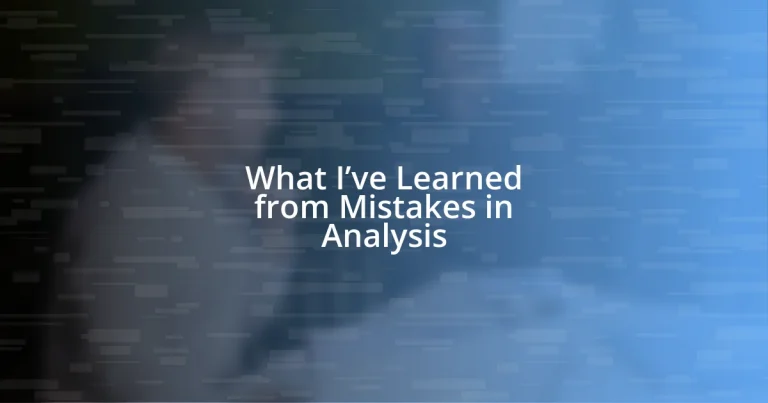Key takeaways:
- Mistakes serve as valuable learning opportunities, fostering growth, resilience, and collaboration in personal and professional settings.
- Common analytical errors include underestimating context, failing to validate sources, and ignoring feedback, which can lead to misleading conclusions and unreliable insights.
- Implementing feedback loops and reflecting on past analyses significantly enhances analytical skills and improves future outcomes.
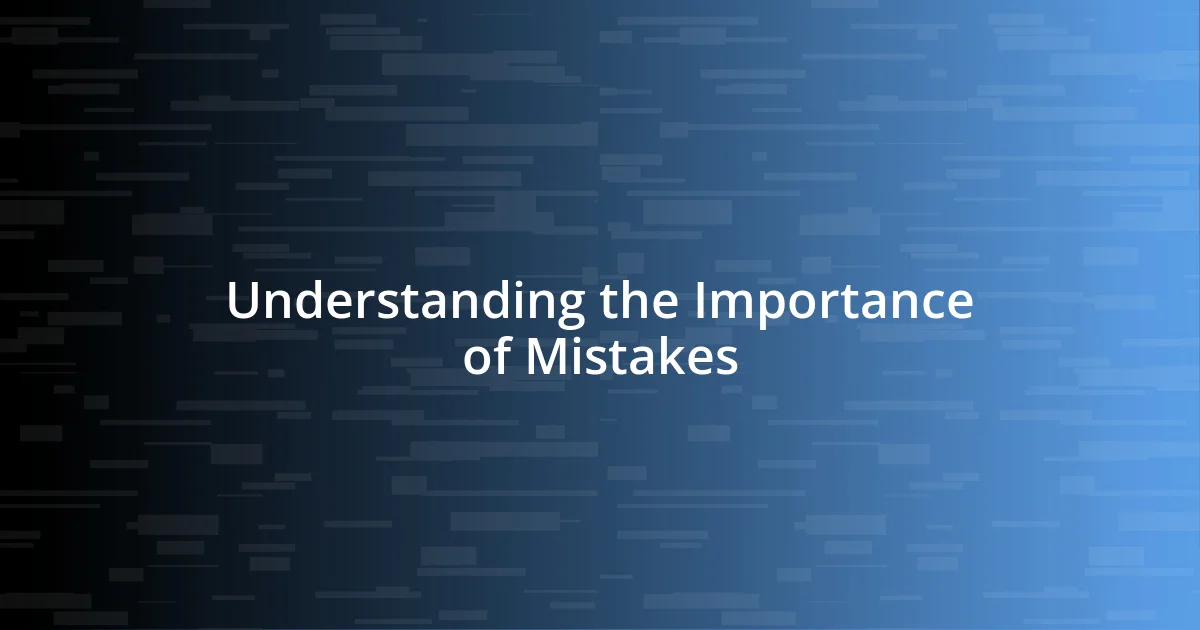
Understanding the Importance of Mistakes
Mistakes are often the most powerful teachers. I recall a time early in my career when I misinterpreted a crucial data set, which led to a flawed analysis. At that moment, it felt frustrating and disheartening, but looking back, I realize that this error forced me to deepen my understanding of data interpretation. Have you ever had an experience where a mistake became your best learning opportunity?
Moreover, embracing mistakes creates a culture of growth, both personally and professionally. I remember discussing my mistakes with colleagues, and what struck me was how they opened the door to constructive conversations. It’s fascinating how vulnerability in sharing errors can lead to collaboration and innovation. Can you think of a moment when admitting a mistake fostered a better team dynamic?
Lastly, mistakes cultivate resilience. I once faced significant criticism for a project that didn’t go as planned. Rather than feeling defeated, I chose to reflect on what went wrong and how I could improve. This shift in perspective not only bolstered my confidence but also equipped me with valuable insights for future endeavors. How has your own journey through mistakes shaped your resilience?
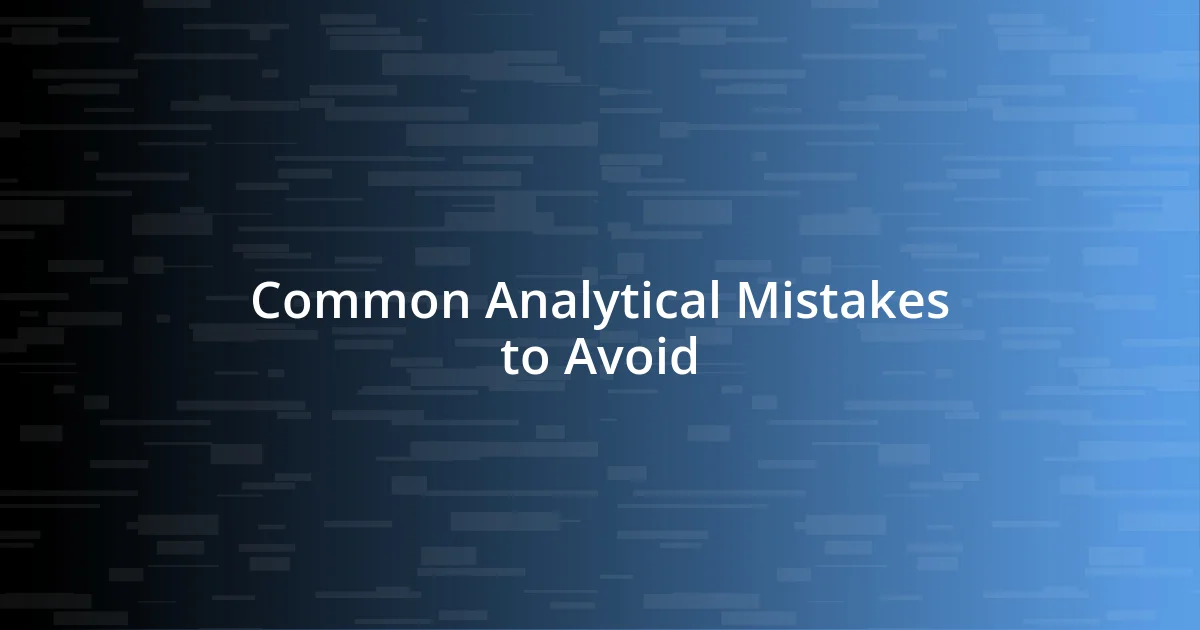
Common Analytical Mistakes to Avoid
When analyzing data, one common mistake I’ve often encountered is underestimating the importance of context. For instance, I once analyzed sales figures without considering seasonal trends, resulting in misleading conclusions. It’s like cooking a recipe without knowing the key ingredients; you just won’t achieve the flavor you expect. Have you ever overlooked an essential detail that changed the entire outcome?
Another common pitfall in analysis is failing to validate your sources. Early in my career, I relied on a single dubious report that skewed my research. It was a tough lesson, but it made me realize that just as in life, having multiple perspectives can vastly improve outcomes. Don’t you think it’s crucial to cross-check information for better reliability?
Lastly, ignoring feedback can seriously derail the analytical process. I remember conducting an extensive analysis only to discover later that I overlooked several critical points shared by my teammates. This taught me the value of collaborative critique; it’s often the outsiders’ view that sheds light on overlooked details. Have you found that feedback often leads to breakthroughs in your work?
| Mistake | Consequence |
|---|---|
| Underestimating Context | Leads to Misleading Conclusions |
| Failing to Validate Sources | Results in Unreliable Insights |
| Ignoring Feedback | Overlooks Critical Inputs |
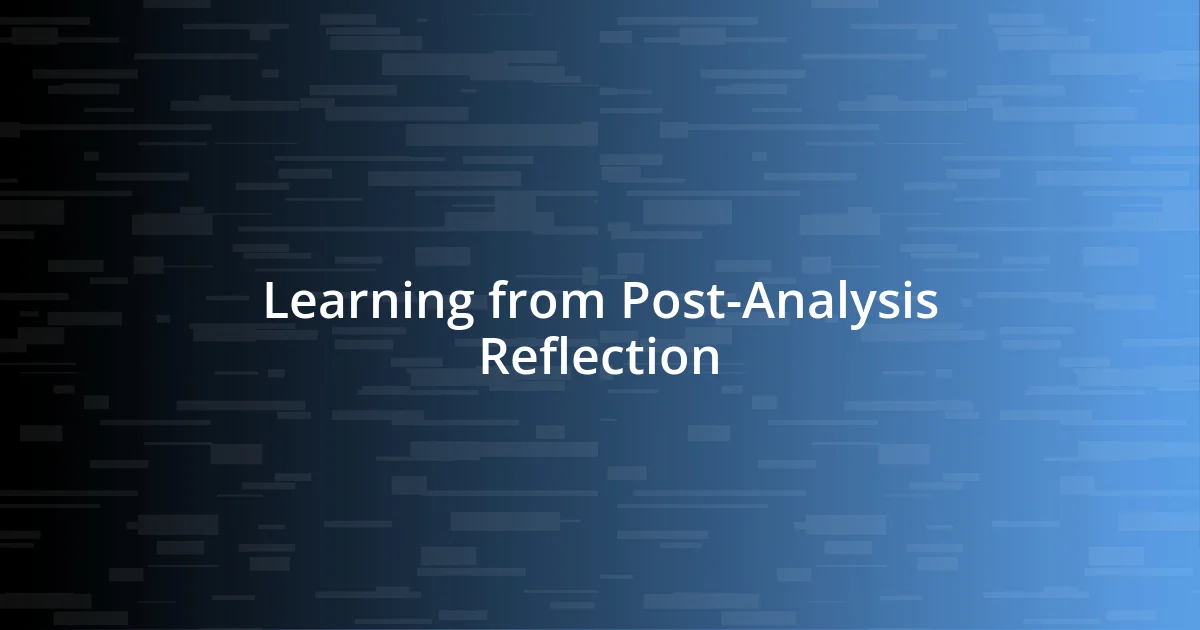
Learning from Post-Analysis Reflection
Reflecting on mistakes after an analysis can be incredibly enlightening. I remember a time when I revisited a previous analysis, realizing I had overlooked certain key variables. It was both humbling and enlightening—an opportunity to reframe my understanding and approach. Engaging in this kind of reflection not only solidifies learning but also prepares us for future challenges.
To enhance your reflection process, consider these strategies:
- Evaluate the data sources: Reassess where the information came from and if it still holds validity.
- Identify emotional reactions: Acknowledge how your feelings may have clouded judgment during the analysis.
- Seek diverse perspectives: Connect with colleagues to gather insights on what they would have done differently.
- Document lessons learned: Keep a reflection journal to track mistakes and the growth that follows.
- Set new goals based on findings: Use reflections to create actionable goals for upcoming analyses.
Taking the time to reflect can transform a moment of error into an invaluable stepping stone. I think about how this process has equipped me with a toolkit of strategies that I now apply proactively, avoiding similar pitfalls and enhancing my analytical prowess.
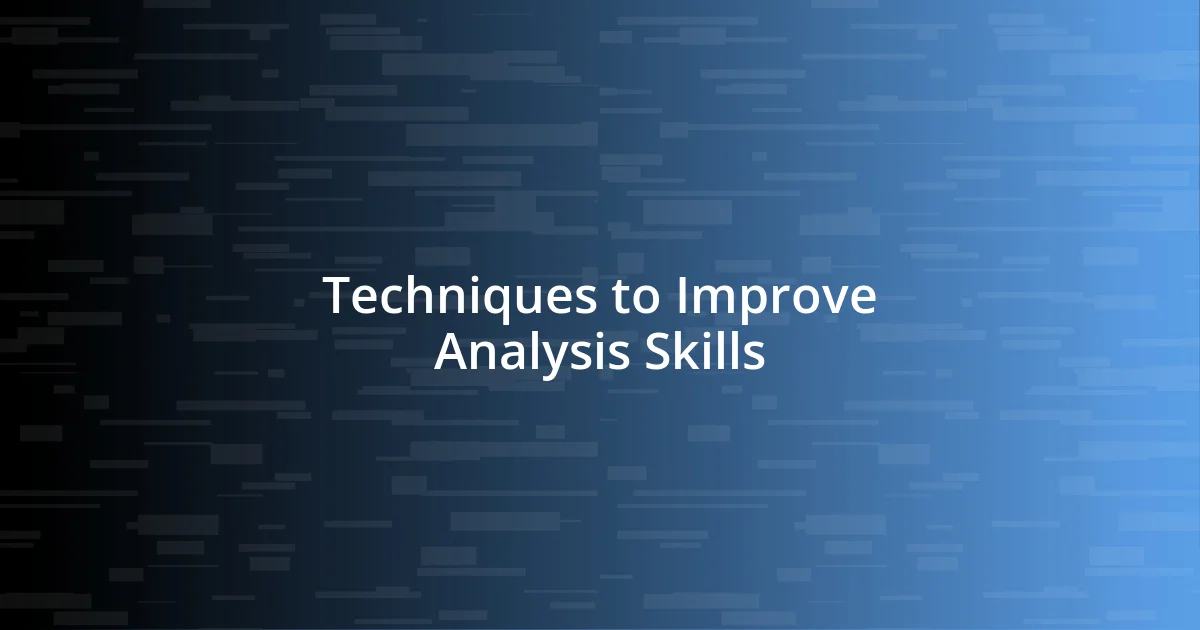
Techniques to Improve Analysis Skills
One technique I find invaluable is breaking down complex data into more manageable chunks. I recall a project where I was overwhelmed by vast datasets, so I created smaller subsets to focus on specific trends. It was like untangling a knot; once I worked through each strand, the overall picture became much clearer. Have you ever felt that clarity emerge when you simplify a daunting task?
Another effective method is to regularly practice critical thinking exercises. Engaging in activities like puzzle solving or brainstorming sessions can sharpen your analytical capabilities. I remember setting aside time each week to tackle brain teasers, and it significantly boosted my ability to assess problems from multiple angles. Have you tried incorporating playful challenges into your routine to enhance your analysis skills?
Lastly, documenting your analytical processes can foster a systematic approach that leads to continuous improvement. I started maintaining a log of my analyses, jotting down the methods used, questions raised, and outcomes achieved. This not only helped me identify patterns in my mistakes but also served as a reference for future projects. What’s your take on the benefits of keeping a detailed record?
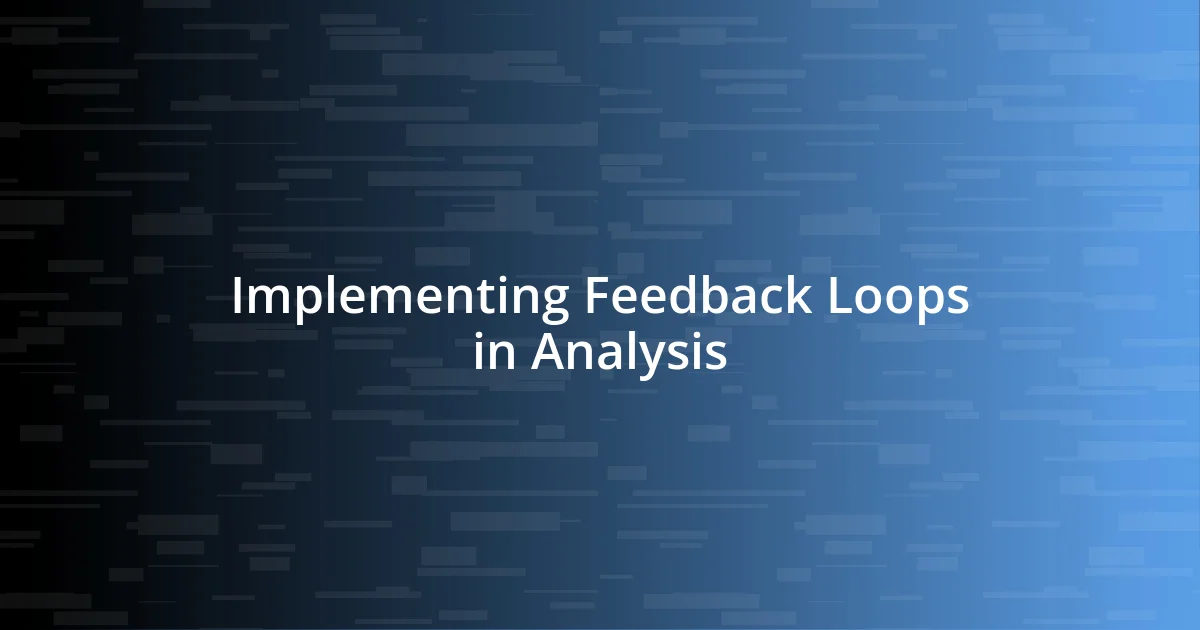
Implementing Feedback Loops in Analysis
Implementing feedback loops in analysis is something I’ve come to value deeply. I remember collaborating on a project where we got together after each milestone to discuss what worked well and what didn’t. This kind of open dialogue not only helped to adjust our methods but also fostered a sense of collective ownership. Have you experienced the magic of collaboration in driving your analytical thinking forward?
Another key takeaway for me has been the power of iterative feedback. After conducting an analysis, I started implementing short review sessions where I’d present my findings to peers. Their insights were often eye-opening, revealing blind spots I hadn’t considered. This practice not only improved the quality of my work but also fortified my confidence in decision-making. Do you seek feedback regularly, or is it something you’re still warming up to?
Moreover, I’ve realized that the feedback loop isn’t just about receiving input; it’s also about adapting and evolving. By revisiting past analyses and applying the suggestions, I’ve seen a noticeable improvement in my approach. It’s like cultivating a garden—nourishing it with various insights leads to richer, more robust outcomes. Have you thought about how incorporating feedback could reshape your analytical journey?
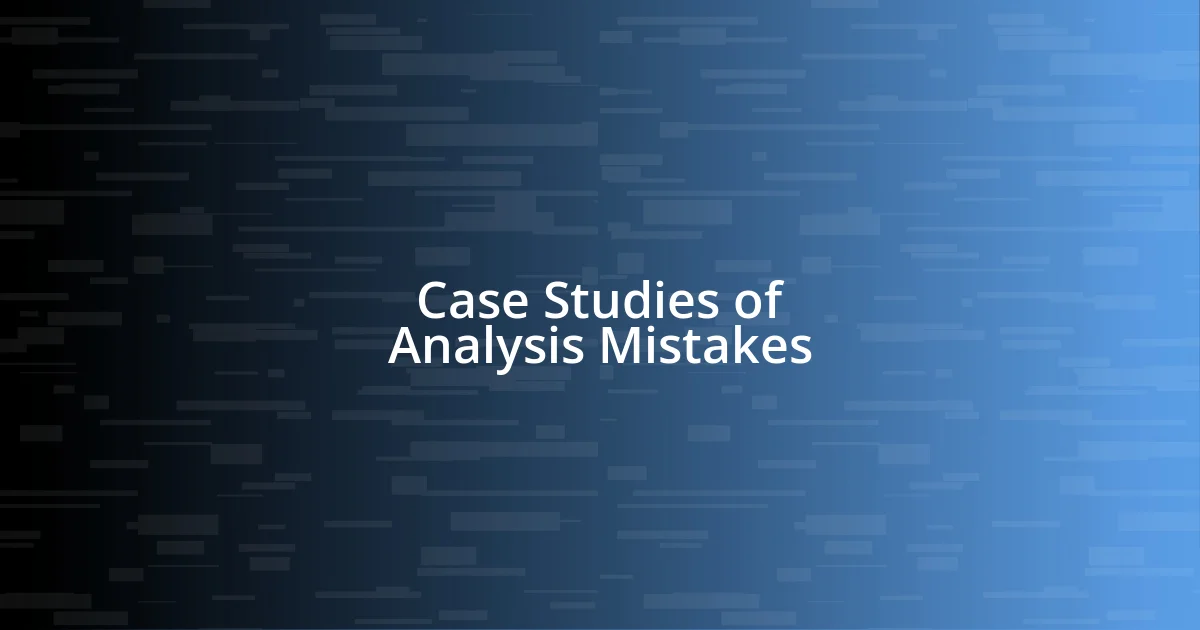
Case Studies of Analysis Mistakes
My experience with mistakes in analysis really hits home when I recall a project I once managed where I prematurely drew conclusions without fully understanding the data. I was so eager to impress that I overlooked key variables, which led to a misguided recommendation. It was a humbling experience, illuminating just how critical it is to take a step back and ensure all factors are accounted for before making bold claims.
There was another instance where I relied too heavily on a single source of data, thinking I had the complete picture. I remember presenting my analysis to the team, brimming with confidence, only to find I had missed crucial insights from other datasets. The disappointment was palpable, but it taught me the importance of diversifying sources for a comprehensive understanding. Have you ever felt that sinking realization after presenting something you thought was solid?
In a different scenario, I mismanaged my assumptions about stakeholders’ perspectives, failing to validate their input during the analysis phase. This misstep not only skewed my findings but also affected team morale. It was a wake-up call that reinforced the need for clear communication and collaboration. How often do we assume we know what others are thinking, only to be surprised later?












